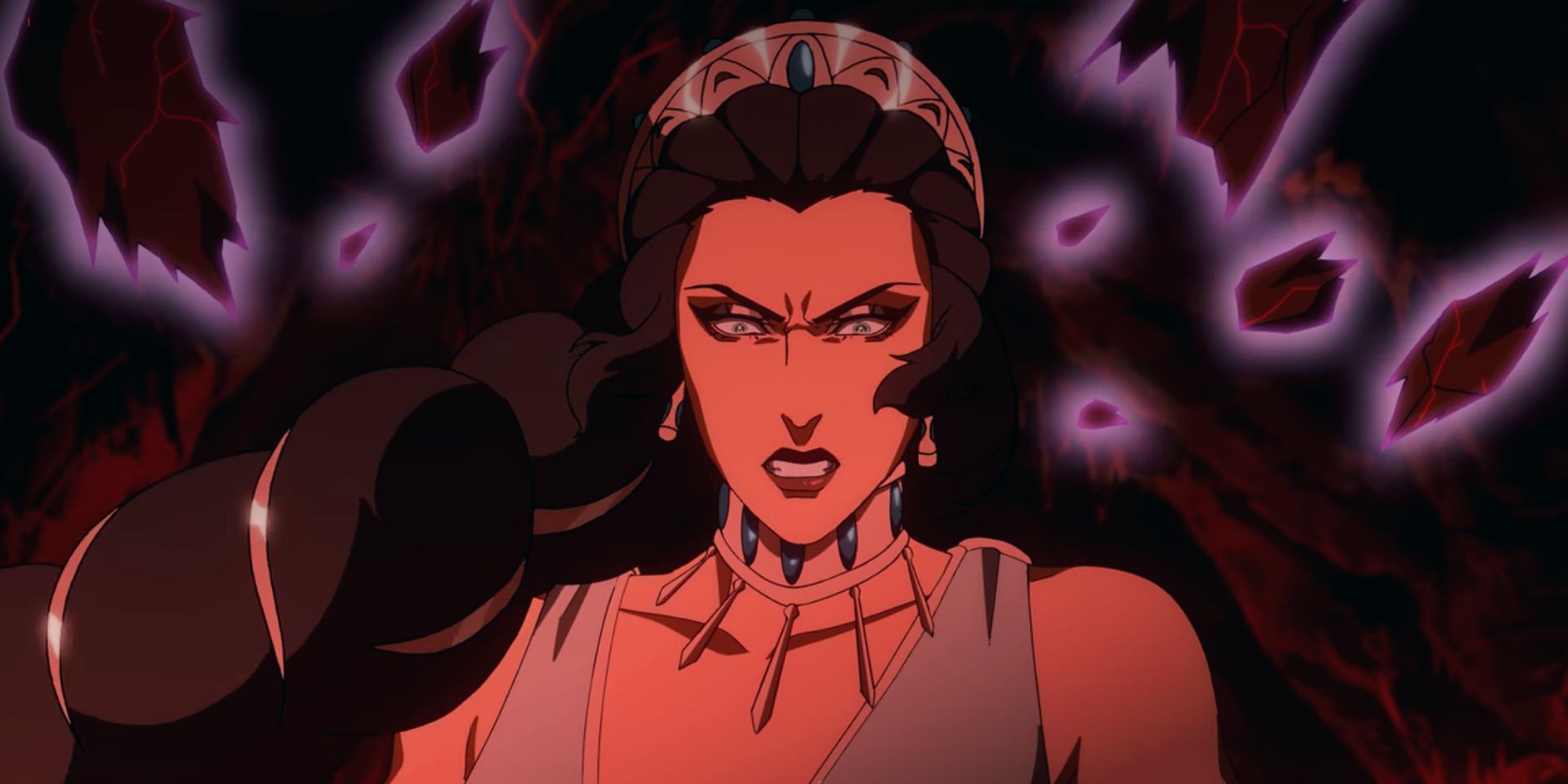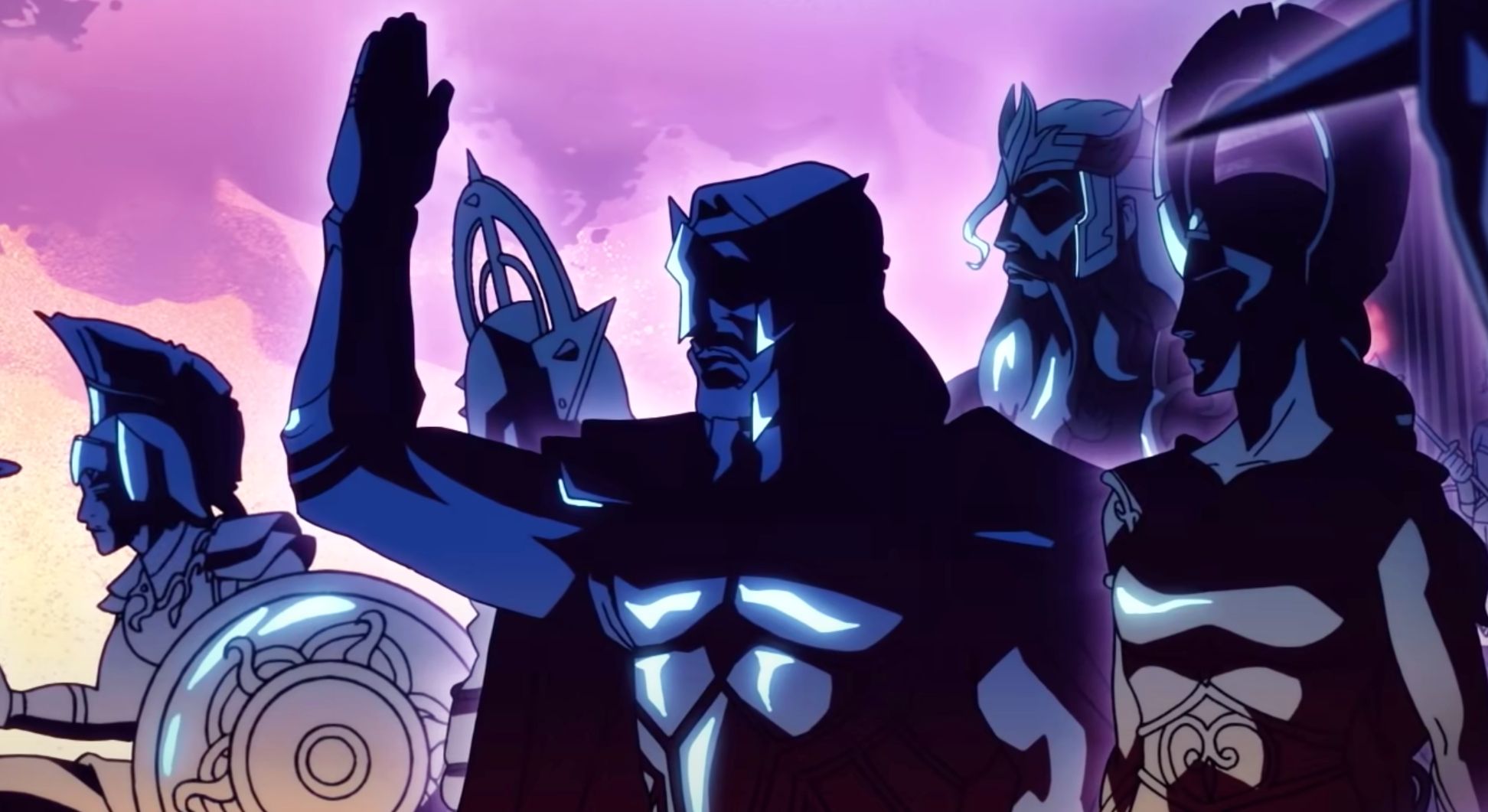Blood of Zeus is a new anime from Netflix with a fresh but faithful take on Greek mythology. Created by Charley and Vlas Parlapanides, the series follows Heron, a young man shunned from his village for being illegitimate, who discovers that he is actually the son of the god Zeus. As discord between the gods escalates and demons threaten the safety of the mortal realm, Heron must work to save it all from destruction. Blood of Zeus is produced by Powerhouse Animation, the same studio as another hit Netflix anime, Castlevania. Where Castlevania is a part of the horror genre, Blood of Zeus simply borrows some horror elements, and is more of a fantasy/adventure tale. Though it makes some notable departures from Greek myth, the series honors its source material by elevating certain concepts to emphasize their mythic roots.
In the first episode, “A Call to Arms,” Blood of Zeus explains that it is telling a lost chapter of Greek myth, passed on through an oral history but never written down. In doing so, the series cleverly gives itself the option to take creative liberties in the interest of the story, but also keeps the door open to retell classic tales, or at least to reference well-established characters and stories, like Perseus and Medusa or Hercules. Many well known characters make appearances, from the centaur Chiron to the three Fates.
Blood of Zeus features many stories from Greek myth that are heightened to raise the stakes of the series, such as Hera’s anger towards Zeus for his infidelity, or the role of the giants that fought against the gods for dominance after the fall of the Titans. Some of the show’s characters, such as Heron and Seraphim, do not have direct counterparts in Greek myth. However, they all have ties back to a concept or story, and blend seamlessly into the world of the series.
Heron

As the main character in Blood of Zeus, it is interesting that Heron does not appear anywhere in Greek myth. This actually works in the series’ favor, as it allows for a little more freedom of movement in terms of storytelling. While Heron himself doesn’t appear in Greek myth, his story is very common. Zeus is known for his enormous number of affairs, often resulting in children that were other gods of the Greek pantheon, or heroes like Hercules. Because Heron’s mother is a mortal, he is a demigod. He possesses great power (as seen in the season finale), but he’s not quite on par with the gods of Olympus. Zeus helps him to hone his powers, and by the time the final battle arrives, Heron proves himself to be truly in touch with his divine abilities.
Seraphim

Seraphim, like Heron, does not appear in Greek myth, and he actually strays the furthest from real mythical roots. Though evil demons (called cacodemons) do exist in Greek mythology, they bear no relationship to the giants like the demons in Blood of Zeus do. Seraphim’s tragic origins also do not seem to appear anywhere in Greek mythology, making him more of a creative offshoot than other characters in the show.
His significance, though, is still great, given that he is Heron’s half brother (the two share their mother, Electra) and an important foil to Heron. Seraphim is the son of Electra’s husband, King Periander, and was nearly drowned by his uncle who wished to take the throne for himself after Periander’s death. Seraphim faced great adversity as he grew up, and later became a demon after discovering his signature bident in the back of a giant, whose remains he eats. His anger is similar to Heron’s but his inability to let go of it leads to his eventual downfall.
Zeus

Zeus is one of the most famous figures in Greek mythology, the King of the gods of Olympus and wielder of lightning. Son of the Titans Cronus and Rhea, he is married to Hera, but is famous for fathering a great many illegitimate children. The Blood of Zeus character shares many commonalities with his counterpart in Greek myth, but the anime series depicts a kinder and more gentle-hearted Zeus. Though Zeus, in Greek myth, can be quite violent with mortals, he endeavors to save them in Blood of Zeus and shows a great deal of concern for his children and lovers, especially when compared with his relative callousness in Greek myth.
In Blood of Zeus, his affair with Electra is born out of love rather than hedonism, and he routinely appears to Heron and Electra as the human Elias, showing them kindness when they are shunned and helping to provide them with food and other resources. Zeus also appears to Heron in his true form and helps to train him on Olympus, even going as far to admit his shortcomings as a father when Heron becomes frustrated with him. This is a sensible change for the series to make, as depicting Zeus as flawed but ultimately good makes him a much more compelling character.
Hera

Hera is Zeus’ wife and Queen of the Heavens, a famous example of the scorned woman trope. In Greek myth, Hera is often depicted as vengeful towards all of Zeus’s lovers and their children, often fighting with gods and mortals, but rarely with Zeus himself. Blood of Zeus elevates Hera’s rage, allowing her to turn it towards the actual cause of her grief. Hera’s anger is born not only out of jealousy, but also a sense of betrayal.
She feels humiliated by Zeus’s actions, and even reminds him that she was Queen of the Heavens before he came along (which is true both in the anime series and in Greek myth). Zeus’s affairs not only hurt Hera, but also humiliate her: they undermine her sense of pride and authority. Her anger towards Zeus is much more well-rounded and though it ultimately spirals out of control, it is deeply understandable and indicative of real-world issues of gender and power.
Alexia and Chiron

While Alexia herself does not appear in Greek mythology, she comes from a race of warrior women who do: the Amazons. In Greek myth, the Amazons were warrior women; skilled fighters who were concerned chiefly with war. Alexia dedicates herself to tracking and defeating demons, and thus protects her fellow mortals – interestingly, the Greek name Alexia means “defender.” Alexia is mentored by another Blood of Zeus character from Greek myth: Chiron, a wise centaur. In Greek myth, he is best known for his facility with medicine, but he serves an important, albeit different, role in Blood of Zeus. Chiron, though he betrays Alexia to Seraphim, is able to give Alexia the map leading to the giant remains, which is instrumental in the saving of Olympus and the mortal realm.
Evios and Kofi

Evios and Kofi do not appear in Greek myth, but are important characters in Blood of Zeus. They befriend Heron when they all meet while imprisoned by Seraphim and the other demons. Helping Heron to escape, they become loyal allies and provide some much-needed levity to an otherwise intense show. The two men are former smugglers, but seek redemption by fighting alongside Heron in the battle against Hera and the giants. The two men reveal in the final episode that they sold giant remains to the demons that Alexia was tracking. However, they regret their actions and dedicate themselves to saving mortals and gods alike, and share a bond that is truly delightful to watch on screen.
Hermes

Hermes plays a significant, if smaller, role in Blood of Zeus that is faithful to his origins in Greek mythology. A god of Olympus and, like Heron, illegitimate son of Zeus, Hermes is the messenger god, famous for his winged sandals. As in Greek mythology, Hermes guides the souls of the departed to the underworld and is seen, in Blood of Zeus, escorting Heron’s mother, Electra, to the afterlife. In the series, Hermes has the added gift of super speed afforded to him by his winged sandals, allowing him to fight skillfully for his father Zeus, to whom he is loyal throughout the show. Because he is not Hera’s child, he shares Heron’s experience of her scorn, and welcomes Heron the most openly of his brothers.
Electra

Though Heron’s mother is not present in Greek mythology, she shares ties to some other mythical women. Her story is similar to that of Hercules’s mother Alcmene in that Zeus pretended to be each woman’s husband. Though with Alcmene, this only lasted a few days, Blood of Zeus tells a story in which Zeus masquerades as a kind version of Electra’s abusive husband, King Periander. Electra calls Zeus on his bluff, but is still in love with him, as he has spent a great deal of time wooing her and treating her with kindness. Less significantly, Electra shares her name with the Greek mythical figure, Electra, the titular character in a famous play by Sophocles. However, other than their shared name and tragic status, the similarities between the two women end there.
Hades

Hades is noticeably absent from Blood of Zeus until the season 1 finale, “War for Olympus.” Like his mythic counterpart, Hades is King of the Underworld, guarding the souls of the dead. It isn’t until Seraphim awakes near the river Styx that Hades reveals his malevolent intentions. He discloses that he is the true owner of Seraphim’s bident and demands that Seraphim kneel to him in exchange for salvation from eternal suffering.
Given that Seraphim discovered his bident plunged into the back of a giant, it seems likely that Hades has had some hand in the rise of demons in the mortal realm, and even that he may have been interfering with the giants, too. Hades seems to be on track to be the major villain in a potential Blood of Zeus season 2. Some Greek myths have implied that Hades was bitter about being relegated to the underworld, and based on the way the series elevated Hera’s resentment of Zeus, it seems likely that Hades, too, will turn his wrath against the gods of Olympus.
Poseidon, Hephaestus, and Other Gods

Other central figures from Greek mythology, such as Poseidon, Hephaestus, Ares, Apollo, and the Fates appear in Blood of Zeus in smaller roles. Their portrayals, while not extensively fleshed out, are true to their roots in Greek myth, and could potentially be expanded in future seasons. Other gods, like Dionysus and Athena, appear in the background or in crowd scenes, but are never specifically named or featured.
Clearly, character designs have been made for some gods without major roles, and they too could appear in any upcoming seasons of the anime series. Though the it has not yet officially been renewed, Blood of Zeus provides a fresh but loyal take on Greek mythology, and has many exciting possibilities for future storylines.





